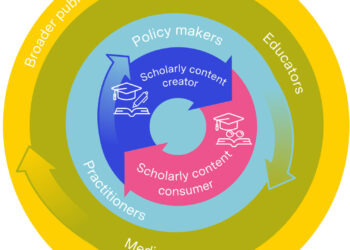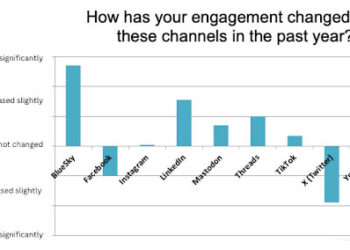
I am pleased to announce that I will be working on a research project concerning the marketing of university press books. This project is funded with the generous support of the Andrew W. Mellon Foundation. The Principal Investigator is Marlie Wasserman, Director of Rutgers University Press. We hope and expect the project will involve the participation of a large number of university presses. We also welcome the participation of other academic book publishers–or any book publisher, for that matter–though in the written report that will accompany this project, we plan to focus on the university press world.
I am going to provide some background for the study in a moment, but first let me invite book publishers of all stripes to fill out the online questionnaire, which can be found here.
(If more than one person in your organization fills out the survey, please provide contact information for the primary individual with whom we should follow up.)
The aim of the questionnaire is to gather some baseline information on direct-to-consumer (D2C) sales by book publishers. We would like to have as many publishers as possible fill it out. Hey, university press people, this means you! If anyone knows a book publisher who should participate in this survey, please share the link to this page with them. We would be pleased to hear from for-profit book publishers, too.
The reason to undertake this study is to try to help university presses, which face serious and growing challenges as they try to distribute their books efficiently. The bricks-and-mortar sales channel has seen the bankruptcy of Borders and the closing of many independent stores and is now under heavy financial pressure. Academic libraries have experienced budget cuts and are struggling to maintain the large collections that have been their historical mission. Online bookselling, especially through Amazon, has been a bright spot for presses for several years, but now that Amazon has become such a dominant player, it has begun to impose highly unattractive business terms on what, after all, are not-for-profit academic publishers.
As a result of these changes in sales patterns, presses’ paths to their ultimate readers are becoming congested and in some cases even being cut off. For example, even though millions of people prefer to read electronic material on Apple devices (iPhones and iPads), Apple’s trading terms make it difficult to display some scholarly books in the Apple iBookstore. This interferes with the dissemination of scholarship and harms the presses’ finances, which will in turn curtail further dissemination of scholarship.
We propose to pursue a pragmatic strategy to help university presses and other academic publishers find new or augmented ways to reach their readership. The attraction of the direct sale of print and electronic books from web sites is that it sidesteps problems with traditional bookstores, library budget cuts, and the dominant role of Amazon. The project will survey how presses currently handle direct sales and how other publishers and direct marketers outside the publishing industry sell on a direct basis, and will explore the various software tools that are essential for an effective direct sales campaign. The results of this study will be prepared in an openly available document and shared with the university press community, with the aim of improving the direct sales of all. We would hope that this research will help presses to sell more books, to sell them to more people, and to learn more about their readership, as direct sales provide opportunities for feedback that is otherwise not available to most publishers.
During the course of preparing the original proposal for this study, we encountered a number of good questions and quite a bit of skepticism about the ability of a university press to sell books on a direct basis. For example, why would someone buy a book from a press’s web site when they can simply get the same book from Amazon, perhaps for a lower price? Another comment was that presses could not develop the necessary secure ecommerce functions that D2C sales require, nor could they realistically hope to make their ebooks available in convenient formats for reading on a variety of mobile devices.
These are all good points, but the fact is that the world has moved beyond them. Most presses are already selling books directly from their Web sites (in some instances, just print books), and they have been able to build or license the necessary software to do this. As for making ebooks available in mobile formats, there is an emergent industry of ereader solutions, some of which may be useful for the press community. That is precisely the kind of thing we hope to study.
We welcome comments and information (including from prospective vendors of D2C solutions). We have set up a special email address for all communications for this project: please write us at rutgersd2c@gmail.com. And, please, fill out that questionnaire. Here is the link again:
https://docs.google.com/forms/d/1U5gfLDHEhHhwwzFi4WhV8rgdT3tib5zJLNYT4SIBTp4/viewform
Thank you.
Discussion
6 Thoughts on "Announcing a University Press Research Project"
Interesting, Joe. Perhaps consumer information would also be helpful. My wife is an Internet shopper who routinely compares manufacturer’s websites with Amazon’s and frequently buys from the former, when they are competitive. I will ask her what her decision rules are for doing this.
I do hope that you have the opportunity to investigate collective solutions. Whether that is a federated system that links all or many university press web sites or something more centralized. I am one of those skeptics that thinks that separate and independent efforts simply cannot be competitive.
You need to know that the AAUP set up the AAUP online catalogue before Amazon even existed. When Amazon came along, the AAUP abandoned its own effort. If I’m not mistaken, Joe believes that it is time for the AAUP to re-examine that type of collective approach.
Good project Joe. I’ve always been impressed by the O’Reilly approach, which has always been ahead of the curve http://shop.oreilly.com/category/ebooks.do . I’m sure you know about O’Reilly but I thought it worth mentioning as something honest and innovative.
The erosion of markets Joe touches on here is quite real and evident to all. But a much greater threat exists to a substantial part of the book market, in paperback form, from the ARL’s approach to “transformative use” in its Code of Best Practices in Fair Use for Academic Libraries, where it is argued that scholarly monographs are being used for a different “purpose” when assigned for classroom use from the original purpose to communicate with other scholars and that such use should therefore be considered “tranformative” fair use, allowing e-reserve systems to digitize and share entire monographs–which would effectively wipe out of the market for university press paperbacks. If you think Amazon is a problem, the ARL is potentially a much bigger problem!


